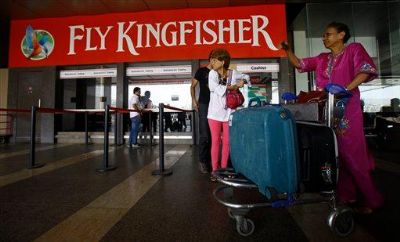
New Delhi, October 2: Kingfisher Airlines Ltd has declared a partial lockout and cancelled all of its flights through Thursday, as labour unrest exacerbates troubles for the debt-laden company.
On Monday, Kingfisher was forced to cancel all of its flights in the latest blow for the carrier as it scrambles to find an investor, sending its stock down by its maximum daily limit.
"Following a series of protracted and unabated incidents of violence, criminal intimidation, assault, wrongful restraint and other illegal acts including refraining from attending work ... management has been forced to declare a partial lock-out at the airline, effective immediately," the company said.
Kingfisher, which is controlled by liquor baron Vijay Mallya and was once India's No. 2 carrier by domestic market share, has struggled with its $1.4 billion debt load. Banks have refused to lend it more unless it can infuse fresh equity.
India warned on Monday it would not allow Kingfisher to fly if safety rules were not followed.
"Kingfisher Airlines has more than a sufficient number of staff to safely operate its current schedule of flights as per the holding plan," the airline said in a statement late on Monday.
The carrier, which has never made a profit, had already grounded most of its fleet.
Shares in Kingfisher closed 4.95 percent down at 15.35 rupees Monday on the National Stock Exchange. Markets are closed on Tuesday for a local holiday.





Comments
Add new comment